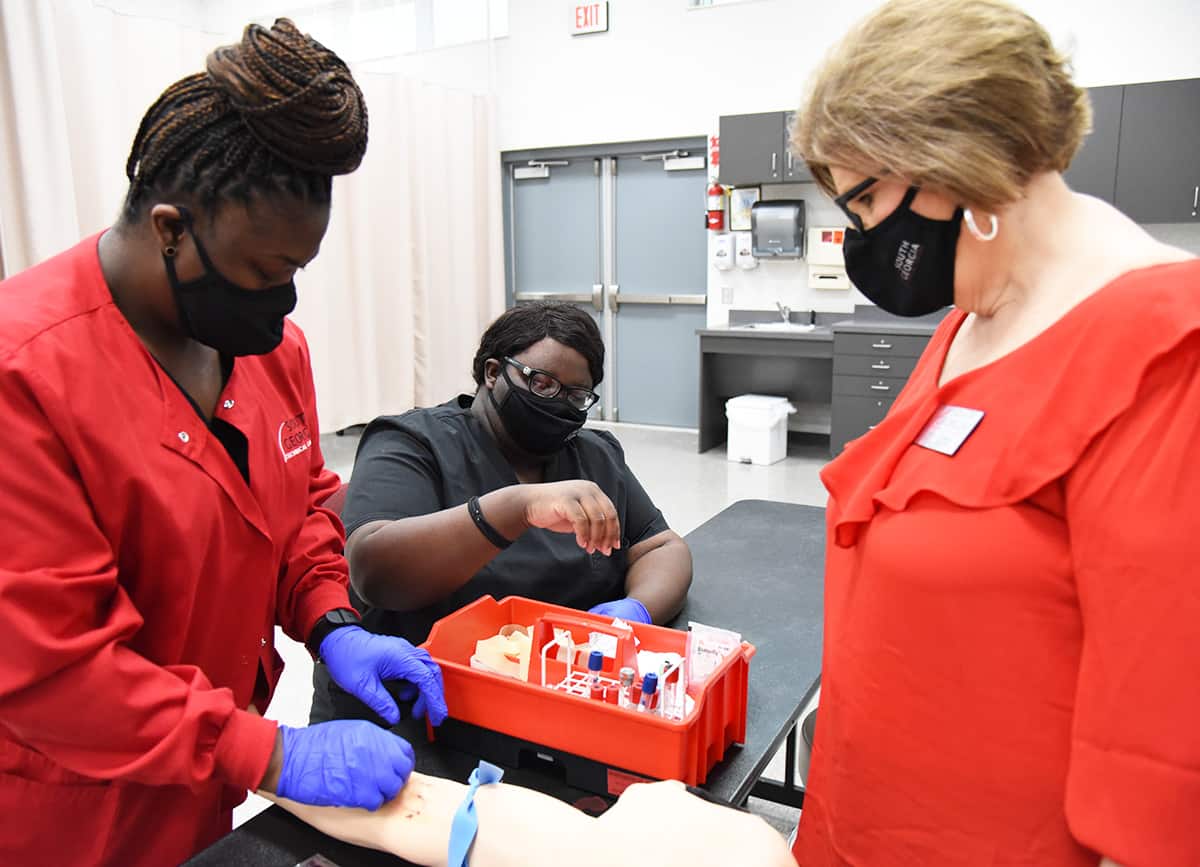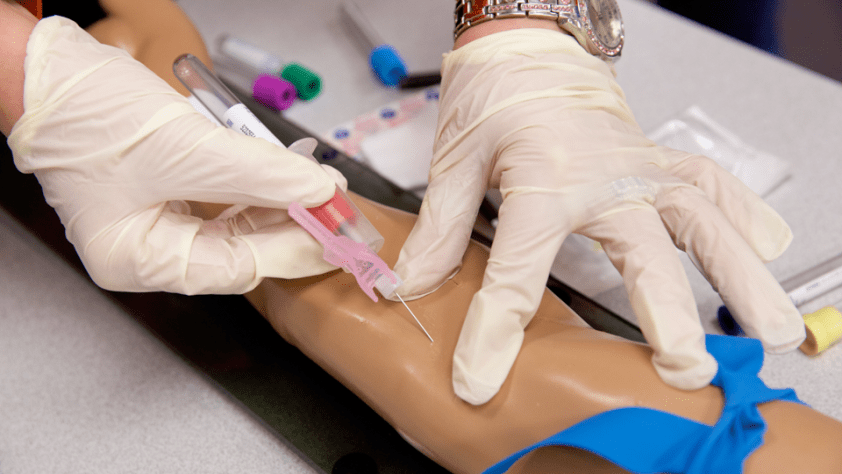Phlebotomy school Success: Tips from Experts
The Course to Certification: Understanding the Phlebotomy Educating Program Journey and Its Importance
As you consider the course to certification in phlebotomy, it's important to recognize the duty you'll play in medical care. Your training will certainly cover essential abilities, from blood collection techniques to patient interaction.

The Role of Phlebotomists in Healthcare
Phlebotomists play a crucial duty in the health care system, acting as the vital web link between people and necessary diagnostic testing. You'll carry out blood draws, guaranteeing samples are gathered properly and securely. Your know-how assists in diagnosing medical problems, keeping an eye on health and wellness, and leading treatment decisions.
In your day-to-day communications, you'll need to establish depend on with clients, making them feel comfy throughout what may be a stressful experience. You are in charge of identifying and taking care of samples thoroughly to avoid contamination or mistakes, which might affect test outcomes.
Past this, you'll often work alongside physicians and nurses, interacting critical information concerning clients' problems. Your role is fundamental in preserving the process in healthcare settings, making sure timely and precise outcomes. By grasping your skills, you add meaningfully to individual care, making you an important part of the medical team. Accepting this duty is crucial to your success as a phlebotomist.
Introduction of Phlebotomy Training Programs
When checking out phlebotomy training programs, you'll discover various types created to fit different timetables and finding out designs. Each program assists you develop crucial skills like blood collection and client interaction. Understanding these options is essential to selecting the appropriate course for your occupation.
Sorts Of Educating Programs
Several types of training programs are offered for those looking to end up being skillful in phlebotomy. Furthermore, some medical facilities and facilities provide on-the-job training programs, supplying sensible experience while you learn. Whatever path you choose, each program intends to furnish you with the needed skills for an effective phlebotomy occupation.

Trick Skills Developed
Grasping phlebotomy requires a set of vital abilities that are created with thorough training programs. You'll find out technological skills like proper capillary selection, needle insertion, and blood collection methods. These hands-on practices ensure you can perform treatments securely and successfully. Furthermore, communication abilities are basic; you'll require to engage with individuals, clarify treatments, and placed them at ease. Recognizing makeup and physiology is critical, also, as it helps you find capillaries and understand the body's action to blood draws. You'll obtain understanding of safety protocols and infection control, ensuring you maintain a sterilized atmosphere. Each of these abilities is necessary for your success as a licensed phlebotomist, making you a beneficial property in any medical care setup.
Key Components of a Phlebotomy Program
In a phlebotomy program, you'll concentrate on essential topics that lay the foundation for your future job. You'll involve in hands-on training that allows you to use what you have actually learned in real-world settings. Both the core educational program and sensible experience are essential for your success as a phlebotomist.
Core Curriculum Overview
While seeking a phlebotomy training course, you'll run into a core educational program created to equip you with fundamental skills and expertise. Phlebotomy school. This curriculum normally consists of makeup and physiology, concentrating on the blood circulation system and understanding blood parts. You'll also discover different sorts of blood collection approaches, consisting of venipuncture and capillary puncture strategies
In addition, infection control and security methods are vital components, guaranteeing you know how to keep a sterilized environment. You'll research patient communication, emphasizing interaction and empathy, which are crucial for relieving client anxiety.
Hands-On Training Experience
Getting hands-on experience is an indispensable part of your phlebotomy training program. This functional training allows you to use what you have actually found out in a real-world setting, improving your skills and self-confidence. You'll site web practice venipuncture techniques, discover exactly how to manage different kinds of specimens, and obtain knowledgeable about the devices utilized in the area. Under the assistance of skilled teachers, you'll fine-tune your abilities, ensuring you're gotten ready for any situation you may encounter.
Furthermore, you'll get the possibility to communicate with individuals, which is essential for establishing your communication abilities. This combination of technical effectiveness and social skills is critical for your success as a certified phlebotomist. Inevitably, hands-on training is where concept satisfies technique, strengthening your expertise and preparedness for accreditation.
Accreditation and Licensing Needs
Prior to you can begin your career in phlebotomy, it is essential to recognize the qualification and licensing requirements that vary by state. A lot of states require phlebotomists to hold an accreditation from a recognized company, such as the National Phlebotomy Organization or the American Society for Scientific Pathology. These qualifications normally entail passing an exam that examines your understanding and abilities in the field.
Along with accreditation, some states have details licensing demands. You may require to complete a particular number of hours in clinical technique, send evidence of training, or undertake a history check. It is necessary to investigate your state's guidelines to make certain you fulfill all necessary standards.
Remaining educated concerning these needs not just assists you protect a setting yet additionally enhances your reliability as an expert. By satisfying these demands, you'll be well on your means to an effective career in phlebotomy.
Hands-On Training and Practical Experience
Hands-on training and practical experience are essential components of your phlebotomy education, as they allow you to apply theoretical knowledge in real-world scenarios. Throughout your training, you'll participate in monitored venipuncture, discover appropriate strategies, and come to be knowledgeable about different blood collection equipment. This direct participation is critical for constructing your confidence and honing your abilities.
You'll function closely with experienced specialists who can direct you through the subtleties of individual communication and example handling. Each session not just reinforces your understanding yet also prepares you for the hectic atmosphere of healthcare settings.
Additionally, lots of programs integrate clinical rotations, enabling you to experience diverse setups, from medical facilities to outpatient centers. This exposure helps you adapt to various difficulties and client needs, ensuring you're well-prepared for your future duty. Embrace these possibilities, as they're important to coming to be an experienced and caring phlebotomist.
Difficulties Faced During Training
While gaining hands-on experience is vital, it's important to recognize the obstacles that can occur throughout your phlebotomy training. Additionally, grasping the abilities needed for blood draws takes method; you may have a hard time with technique at Find Out More first.
Time administration can likewise be a difficulty, as harmonizing theory, practical sessions, and individual commitments can feel challenging. You may encounter varying finding out rates amongst your peers, causing feelings of insecurity if you think you're dropping behind. Finally, adapting to the various personalities of trainers can be difficult, as each might have an one-of-a-kind mentor style.
Acknowledging these barriers at an early stage can prepare you for success and help you establish durability throughout your training journey.
Career Opportunities After Certification

As you obtain experience, you could even think about concentrating on areas like pediatric or senior citizen phlebotomy, accommodating certain patient needs. Some phlebotomists choose to progress their jobs by becoming research laboratory service technicians or seeking more education in healthcare areas.
Furthermore, your certification can result in duties in training or supervising new phlebotomists, enabling you to share your knowledge. With the medical care market constantly expanding, your skills will certainly always remain in need, leading the way for a stable and satisfying occupation. Embrace the chances awaiting you!
Frequently Asked Inquiries
What Is the Typical Duration of a Phlebotomy Training Course?
Phlebotomy training courses generally last around four to eight weeks. You'll take part in hands-on technique, class instruction, and online discovering. Completing this training prepares you for qualification and a gratifying job in health care.
Are Online Phlebotomy Courses Available?
Yes, on-line phlebotomy programs are readily continue reading this available. They provide versatility and comfort, enabling you to research at your own pace. Just verify the program is recognized to fulfill certification needs and get useful skills for your career.
Just How Much Does Phlebotomy Training Normally Expense?
Phlebotomy training normally costs in between $700 and $2,500, depending upon the program and place. You must take into consideration aspects like course length, included products, and hands-on experience when picking the appropriate training for you.
What Are Typical Prerequisites for Phlebotomy Training?
Typical prerequisites for phlebotomy training typically include a senior high school diploma or GED, immunizations, and a background check. Some programs might likewise need basic health care knowledge or accreditations, ensuring you're prepared for hands-on training.
Can I Work While Finishing My Phlebotomy Training?
Yes, you can function while completing your phlebotomy training. Lots of students equilibrium work with their studies, yet ensure to manage your time properly to assure you meet both job and training commitments successfully.